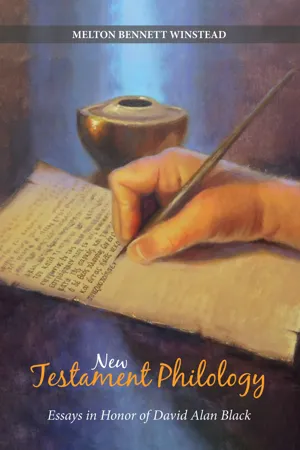
New Testament Philology
Essays in Honor of David Alan Black
- 264 pages
- English
- ePUB (mobile friendly)
- Available on iOS & Android
About this book
This work is dedicated to David Alan Black, a New Testament scholar who has contributed to the love of the Koine Greek language as it pertains to New Testament studies in numerous ways--as a professor, author, missionary, and editor. The goal of this book is to demonstrate for students the value of continued research in the Greek New Testament. The essays demonstrate how research is currently being done, utilizing such tools as grammatical studies, discourse analysis, textual criticism, verbal aspect, and other linguistic analyses. The chapters include studies on exegesis, verbal aspect, prepositional compounds, relevance theory, and scripture memorization. This book demonstrates the explanatory power of an in-depth usage of New Testament Greek. It is recommended for those who have had at least one year of Greek.
Frequently asked questions
- Essential is ideal for learners and professionals who enjoy exploring a wide range of subjects. Access the Essential Library with 800,000+ trusted titles and best-sellers across business, personal growth, and the humanities. Includes unlimited reading time and Standard Read Aloud voice.
- Complete: Perfect for advanced learners and researchers needing full, unrestricted access. Unlock 1.4M+ books across hundreds of subjects, including academic and specialized titles. The Complete Plan also includes advanced features like Premium Read Aloud and Research Assistant.
Please note we cannot support devices running on iOS 13 and Android 7 or earlier. Learn more about using the app.
Information
Who is Resisting—the Righteous One or Someone Else?
Table of contents
- Title Page
- Permissions
- List of Contributors
- Introduction
- Chapter 1: Who is Resisting—the Righteous One or Someone Else?
- Chapter 2: “Give Me This Water(!)”
- Chapter 3: Verbal Aspect and Imperatives
- Chapter 4: Semitic Wordplay Behind the Greek of the New Testament
- Chapter 5: An Overview of the Gnomic or Logical Future Tense in the Pauline Corpus
- Chapter 6: The Role of Chiasm for Understanding Christology in Hebrews 1:1–14*
- Chapter 7: The Virginal Conception
- Chapter 8: Is Relevance Theory Relevant for Biblical Studies?
- Chapter 9: Disarming Significant Textual Issues in Jude
- Chapter 10: The Linguistic Features of Second Timothy and Its Purpose
- Chapter 11: Scripture Memorization and Theological Education
- Chapter 12: Defining Discourse Analysis as an Important New Testament Interpretive Framework
- Chapter 13: Legal Metaphors in 2 Thessalonians 1 and 2
- Chapter 14: “Participatory” Language in Ephesians Mediated through Σύν Compounds